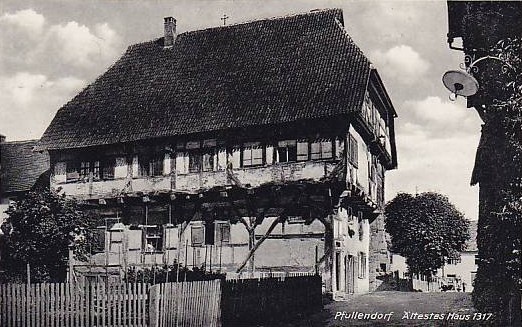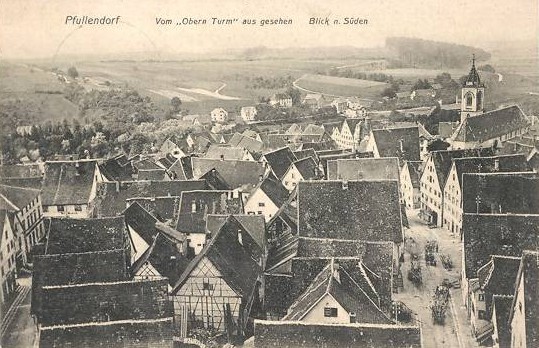Pfullendorf Rathaus, circa 1905.jpg on:
[Wikipedia]
[Google]
[Amazon]
Pfullendorf is a small town of about 13,000 inhabitants located north of


 In June 1220, Emperor Frederick II elevated Pfullendorf to the status of Imperial City. However, the prince-bishops of Constance, as the biggest landowners in the Linzgau and patrons of several religious institutions such as Holy Spirit Hospital in Pfullendorf, continued to exert significant political influence over the whole area. At the
In June 1220, Emperor Frederick II elevated Pfullendorf to the status of Imperial City. However, the prince-bishops of Constance, as the biggest landowners in the Linzgau and patrons of several religious institutions such as Holy Spirit Hospital in Pfullendorf, continued to exert significant political influence over the whole area. At the

 Like most of the other 50 Free Imperial Cities, Pfullendorf lost its freedom in the course of the mediatisation of 1803 and was annexed to the Margraviate of Baden.
The old hospital building in the center of town was sold and in 1845 (it now houses the restaurant ''Deutscher Kaiser'') and a new hospital opened on the site of a former monastery near the Upper Gate. The city was connected to the railway network in 1873-75.
Pfullendorf remained an administrative center in the upper Linzgau until 1936. It then became part of the district of
Like most of the other 50 Free Imperial Cities, Pfullendorf lost its freedom in the course of the mediatisation of 1803 and was annexed to the Margraviate of Baden.
The old hospital building in the center of town was sold and in 1845 (it now houses the restaurant ''Deutscher Kaiser'') and a new hospital opened on the site of a former monastery near the Upper Gate. The city was connected to the railway network in 1873-75.
Pfullendorf remained an administrative center in the upper Linzgau until 1936. It then became part of the district of
Official website
{{Authority control Sigmaringen (district) Free imperial cities Baden
Lake Constance
Lake Constance (german: Bodensee, ) refers to three Body of water, bodies of water on the Rhine at the northern foot of the Alps: Upper Lake Constance (''Obersee''), Lower Lake Constance (''Untersee''), and a connecting stretch of the Rhine, ca ...
in Baden-Württemberg, Germany. It was a Free Imperial City of the Holy Roman Empire for nearly 600 years.
The town is in the district of Sigmaringen south of the Danube valley and therefore on the continental divide between the watersheds of the Rhine and the Danube. The area is known as the Linzgau.
History


Early history
Pfullendorf was founded by theAlamanni
The Alemanni or Alamanni, were a confederation of Germanic tribes
*
*
*
on the Upper Rhine River. First mentioned by Cassius Dio in the context of the campaign of Caracalla of 213, the Alemanni captured the in 260, and later expanded into pres ...
tribe during their third wave of settlement and might have been named after a clan chief named ''Pfullo''. According to another theory, it was named ''Dorf am Phoul'' (''Pfuol''), meaning ''village on the Phoul''.
The area around Lake Constance, particularly the Linzgau, Hegau and Vorarlberg, came progressively under the rule of the counts of Pfullendorf from the 8th century onward. The earliest documented bearer of that name was Count Ludwig von Pfullendorf, who is referred to as the ruler of the county of Hegau from 1067 to 1116. Presumably, Pfullendorf expanded due to its proximity to the counts' castle. Count Rudolf, a partisan of the future Emperor Frederick I Barbarossa, was able to expand his family's possessions and they eventually owned fiefs from the Danube to the Grisons. Following the death of his son Berthold in 1167, Count Rudolf named the Emperor as his heir and then moved to the Holy Land where he died in 1181.
Free Imperial City
 In June 1220, Emperor Frederick II elevated Pfullendorf to the status of Imperial City. However, the prince-bishops of Constance, as the biggest landowners in the Linzgau and patrons of several religious institutions such as Holy Spirit Hospital in Pfullendorf, continued to exert significant political influence over the whole area. At the
In June 1220, Emperor Frederick II elevated Pfullendorf to the status of Imperial City. However, the prince-bishops of Constance, as the biggest landowners in the Linzgau and patrons of several religious institutions such as Holy Spirit Hospital in Pfullendorf, continued to exert significant political influence over the whole area. At the Council of Constance
The Council of Constance was a 15th-century ecumenical council recognized by the Catholic Church, held from 1414 to 1418 in the Bishopric of Constance in present-day Germany. The council ended the Western Schism by deposing or accepting the res ...
(1415), King Sigismund granted ''Blutgerichtsbarkeit'' ("Blood justice" or the right to pronounce sentences of death or mutilation) to the town, a status that confirmed the city as being answerable to God and to the Emperor only.
Starting in 1383, Pfullendorf ruled itself according to a constitution that gave decisive powers to the town guilds and provided for the annual election of the mayor. A 50-member “High Council” also elected annually, was vested with executive authority alongside a 17-member “Small Council” chaired by the mayor. With brief interruptions, this guild-based constitution remained in force until 1803 and was to serve as a model for other cities.
Pfullendorf became a member of the powerful Swabian League in 1488 and took part in the war of 1492 against Duke Albrecht of Bavaria. The city was assigned to contribute 4 footmen, 6 horsemen, 4 wagons and 8 tents for the campaign.
Like a few other small Free Imperial Cities in the vicinity of Lake Constance, Pfullendorf was comparatively untouched by the turmoil that engulfed Germany during the Protestant Reformation and it was to be one of the 12 Free Imperial Cities, out of 50, that was to be officially classified as Catholic at the Peace of Westphalia, that also explicitly stated for the first time that Free Imperial Cities enjoyed the same degree of independence (Imperial immediacy
Imperial immediacy (german: Reichsfreiheit or ') was a privileged constitutional and political status rooted in German feudal law under which the Imperial estates of the Holy Roman Empire such as Imperial cities, prince-bishoprics and secular prin ...
) as the other Imperial Estates.
Although the Black Death, the Peasants' War, the Reformation, the Thirty Years' War, the War of the Spanish Succession and the French Revolution left their marks on the region, Pfullendorf was able to avoid major destruction. During the Thirty Years's war, the city was fought over for five hours in 1632 and the pilgrimage church of Maria Schray, along with its Gothic choir, was burned down.
End of the Free Imperial City of Pfullendorf

 Like most of the other 50 Free Imperial Cities, Pfullendorf lost its freedom in the course of the mediatisation of 1803 and was annexed to the Margraviate of Baden.
The old hospital building in the center of town was sold and in 1845 (it now houses the restaurant ''Deutscher Kaiser'') and a new hospital opened on the site of a former monastery near the Upper Gate. The city was connected to the railway network in 1873-75.
Pfullendorf remained an administrative center in the upper Linzgau until 1936. It then became part of the district of
Like most of the other 50 Free Imperial Cities, Pfullendorf lost its freedom in the course of the mediatisation of 1803 and was annexed to the Margraviate of Baden.
The old hospital building in the center of town was sold and in 1845 (it now houses the restaurant ''Deutscher Kaiser'') and a new hospital opened on the site of a former monastery near the Upper Gate. The city was connected to the railway network in 1873-75.
Pfullendorf remained an administrative center in the upper Linzgau until 1936. It then became part of the district of Überlingen
Überlingen is a German city on the northern shore of Lake Constance (Bodensee) in Baden-Württemberg near the border with Switzerland. After the city of Friedrichshafen, it is the second largest city in the Bodenseekreis (district), and a cent ...
, and has been a part of the district of Sigmaringen since 1973. During the administrative reforms that occurred from 1972 to 1976, the neighboring villages of Aach-Linz, Denkingen, Gaisweiler, Tautenbronn, Großstadelhofen, Mottschieß, Otterswang, and Zell-Schwäblishausen became part of Pfullendorf.
Culture
TheGerman Army
The German Army (, "army") is the land component of the armed forces of Germany. The present-day German Army was founded in 1955 as part of the newly formed West German ''Bundeswehr'' together with the ''Marine'' (German Navy) and the ''Luftwaf ...
's Special Operations Training Centre (german: Ausbildungszentrum für spezielle Operationen) is located in Pfullendorf, as was the NATO International Long Range Reconnaissance Patrol School following its move from Weingarten Weingarten may refer to:
Places
* Weingarten, Württemberg, Germany
** Weingarten Abbey
* Weingarten (Baden), Germany
* Weingarten, Rhineland-Palatinate, Germany
* Weingarten, Thuringia, Germany
* Weingarten, Switzerland
* Weingarten, Missouri ...
to its closure in 1999. In 2001 the United States Army took command of the I-LRRP School in Pfullendorf and the name was changed to the International Special Training Centre (ISTC). ISTC is the International Wing (I-Wing) of the German Ausbildungszentrum Special Operations.
Twin towns
*Allschwil
, neighboring_municipalities= Baselland (BL), Binningen, Buschwiller (FR-68), Hégenheim (FR-68), Neuwiller (FR-68), Oberwil, Saint-Louis (FR-68), Schönenbuch
, twintowns = Pfullendorf (Germany), Blaj (Romania)
}
Allschwil () is a town a ...
in Switzerland
). Swiss law does not designate a ''capital'' as such, but the federal parliament and government are installed in Bern, while other federal institutions, such as the federal courts, are in other cities (Bellinzona, Lausanne, Luzern, Neuchâtel ...
since April 13, 1984
* Saint-Jean-de-Braye in France since May 1, 1987
Notable Pfullendorfers
*Roderich Kiesewetter
Roderich Kiesewetter (born 11 September 1963) is a former Bundeswehr general staff officer and politician of the Christian Democratic Union (CDU) who has been serving as a member of the German Bundestag since 2009.
Early life and career
After p ...
, politician
* Daniel Schuhmacher, '' DSDS'' winner for Season 6.
* Sinan Gümüş
Sinan Gümüş (born 15 January 1994) is a German professional footballer who plays as a forward for Turkish TFF First League club Eyüpspor.
Club career Early years
Born in Pfullendorf to Turkish parents, Gümüş is a youth product of TSV Aa ...
, Galatasaray, professional football player.
References
External links
Official website
{{Authority control Sigmaringen (district) Free imperial cities Baden